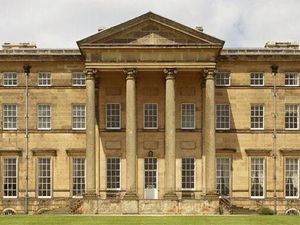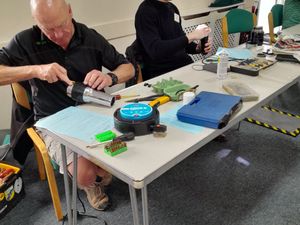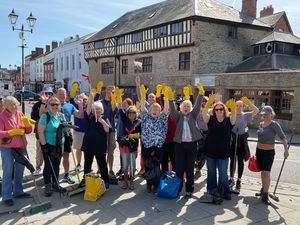Peter Vaughan: Obituary
A veteran tough guy of screen and stage, Peter Vaughan, who died today at the age of 93, was a giant both physically and as an actor.
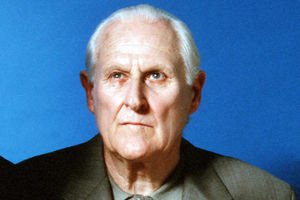
Vaughan - born Peter Ohm in Shropshire, on April 4, 1923 - was a performer with immense "presence". Tall and large-framed, he was unmissable.
But it was his facial features that were unforgettable - his stock-in-trade barely requiring the embellishment of make-up.

Peter Vaughan's was a look carved like stark granite with a forceful chin and nose and deep-set eyes that would flash with glints of menace or devilment and a slit of a mouth that split into a mirthless laugh.
His career was filled with a succession of tough guy characters but so skilled an actor was he that each part was marked with its own individuality and his performances were cast against a vast range.
Among his most notable roles was Felix Hutchinson in the BBC's epic Our Friends In The North. He played a character who aged from 47 to 77, disillusioned with the Labour Party, at odds with the younger generation and finally a victim of Alzheimer's Disease.
He went on immediately to make acclaimed performances in a film version of The Crucible and a stage production of Twelve Angry Men.
Most recently he starred in four series of HBO's Game Of Thrones as Maester Aemon, the blind, scholarly mentor and guide to Jon Snow (Kit Harington) after the young man joins the Night's Watch.
To many older television viewers he was best known for his 1970s sitcom roles as Wolfie's chief opponent in Citizen Smith and Groutie, the gangland boss who ran Slade Prison, in Ronnie Barker's Porridge.
He was born in Wem on April 4 1923, and the family moved to Uttoxeter, in Staffordshire, when he was young.
The Ohms were of Austrian origin and Peter was their only child. His school days he recounted as being unremarkable and although he played both cricket and soccer for the school he was not good enough to follow sport professionally.
His career was finally marked out by Miss Joy Belford, a supervisor of the Staffordshire Education Committee who had seen his performances in school plays.
When he told her he wanted to be an actor she wrote to the Wolverhampton Repertory Company and at 17 he had a job as a student assistant stage manager.

He soon decided that he could not become a successful actor with the name Ohm so he adapted his mother's maiden name Vorn, altering the spelling to Vaughan.
In 1942 he joined the army and served for five years in Europe and the Far East. While in Singapore, where he was commissioned in the Royal Corps of Signals, he had his first experience of radio work as a newscaster for Radio Malaya.
At the end of the war the radio company offered him a three-year contract but he decided to rejoin his old rep company in England.
From Wolverhampton he went on to the Manchester Library Theatre and by the early 1950s he had joined the Birmingham Repertory Company.
It was at Birmingham that he met another young actor who was to become a lifelong friend, Donald Pleasence. Vaughan said Pleasence, later famous as James Bond villain Ernst Stavro Blofeld opposite Sean Connery in You Only Live Twice, "became like an older brother to me".
Vaughan's first West End performance came in 1954 in a production of Moliere's Le Malade Imaginaire. He decided to stay in London and went into lodgings with Donald Pleasence.
In those lean years he and Pleasence queued together for dole money and would then go to Lords to watch cricket.
Vaughan took a few television and film roles, often cast as the villain. He said: "Luckily I'm not beautiful - otherwise I might have starved".
His big break came in 1964 when he starred in Orton's comedy Entertaining Mr Sloane. It was considered outrageous at the time and caused a sensation. He recalled that Judy Garland used to come and take the whole cast out for dinner.
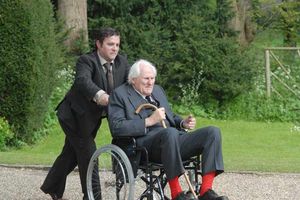
Film parts followed and in 1970 he was cast as the head of the villagers in Sam Peckinpah's violent and controversial Straw Dogs. He was one of the group Peckinpah called his "British Wild Bunch" and by way of explanation Vaughan later said: "We did go round as a gang. And there were one or two ... escapades".
Meanwhile, his television career took off with the plum role of Det Chief Superintendent Cradock in London Weekend's The Gold Robbers. He was well known on the set for his sense of humour and practical jokes which, according to Pleasence, were part of Vaughan's persona.
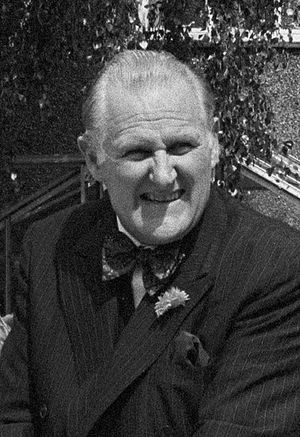
He was quoted as saying: "There are at least two Peters. One is shy and reticent, the other is the wild Peter - with a great sense of humour."
He was more and more in demand on television in a wide range of productions from the popular sitcoms to action series dramas such as Fox. There were adaptations of Treasure Island, Oliver Twist, Great Expectations and dramas, including Winston Churchill - The Wilderness Years.
Dividing his time between television and films, such as The Missionary, The French Lieutenant's Woman and Brazil, would have been enough for many but he also enjoyed radio drama where, with his physical presence hidden, he played roles like frail old Mr Dorrit in Dickens' Little Dorrit.
He was married to actress Billie Whitelaw for 12 years after which he married another actress Lillas Walker, whom he had first met in his repertory days.
After his own lonely childhood he enjoyed the family life he had with Lillas, their son David and his twin step-daughters at their manor house in Crawley, West Sussex.

